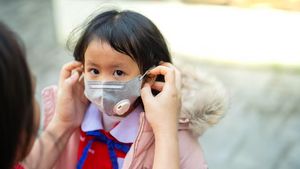JAKARTA - Domestic violence (KDRT) by married couples, whether it's husband or wife, has a negative impact on the psyche of children who are eyewitnesses, there is even a risk that children will experience mental health problems.
"Children tend to tend to have a tendency to experience mental health disorders such as anxiety, post-traumatic stress disorders (PTSD), depression, even thoughts or behaviors that lead to suicide," said clinical psychologist Anggiastri Hanantyasari Utami from Gadjah Mada University, quoted from ANTARA, Tuesday, October 11.
Watching domestic violence can trigger anxiety and fear of neglect by adults.
The member of the Indonesian Clinical Psychologist Association (IPK) explained that it is usually adults or parents who are mentally unwell due to quarrels will affect how they care for and raise children.
There is a study that says that frequently witnessing or being in a persistently depressed situation can make children experience developmental disorders in their brain that affect their ability to think, speak, emotions and behavior, he continued.
Not only that, the aggressive behavior seen by children when domestic violence occurs in front of them can be imitated by the baby, so that there is a tendency for violence to be repeated in the future.
"When a child reaches the age of five and over, the aggressive behavior shown by parents can make the child imitate this aggressive behavior and be applied as a coping mechanism or the way he solves his problems in the future," he explained.
In line with Anggiastri, adult clinical psychologist Annisa Prasetyo Ningrum from the University of Indonesia said domestic violence in the family can be an experience that leaves trauma for children.
Because, the family that should be the closest person and provide a sense of security also shows violence. As a result, fear and anger arise in children.
"The experience of witnessing or experiencing domestic violence during childhood is often one of the predictors of developing behavioral problems, emotional control, or learning problems in the future," said the West Java Clinical Psychology Association member to ANTARA, Tuesday.
The earliest step that can be done as a recovery effort is to try for children to be in an environment that makes them feel safe.
According to Annisa, cooperation from family, school, environment, and health workers is needed in the process of recovering children's condition because each child lives a different traumatic event.
He said no one can guarantee a similar experience will not happen again in the future, but what can be done is to try to make children feel safe and comfortable so that they want to be open in discussing what is experienced and feel with those closest to them. People around children must also help so that children can learn to manage their emotions positively.
The English, Chinese, Japanese, Arabic, and French versions are automatically generated by the AI. So there may still be inaccuracies in translating, please always see Indonesian as our main language. (system supported by DigitalSiber.id)













